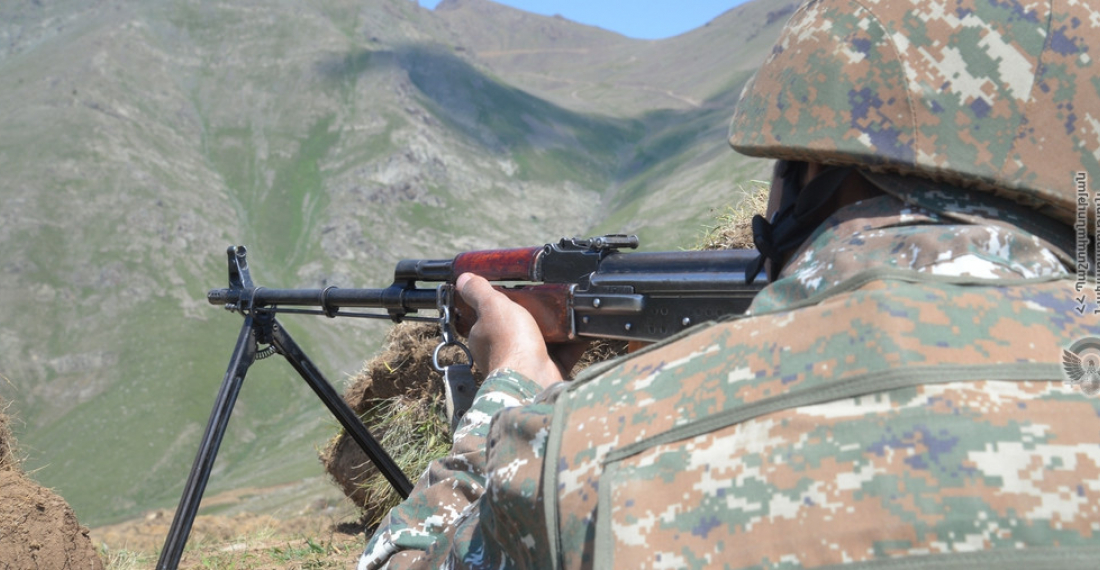There are reports of various violent incidents in the Nagorno-Karabakh conflict zone, with both sides accusing each other of various violations. The Russian forces stationed in the territory appear not to be able to control the situation.
On Thursday (24 March), Armenia accused Azerbaijan of “invading” parts of Nagorno-Karabakh controlled by Russian peacekeeping forces. Both sides have reportedly suffered casualties as a result of skirmishes along the border.
A statement by the Armenian Ministry of Foreign Affairs said yesterday that “Azerbaijani armed forces violated the line of contact of Nagorno-Karabakh in the zone of responsibility of the Russian peacekeeping mission and invaded the village of Parukh”. It added that these actions grossly violated the established ceasefire, and that this incursion had been preceded by “the targeting of civilian infrastructure with large-caliber weapons, threats to the Armenians of Artsakh, and other steps aimed at ethnic cleansing”.
A second report published later in the day claimed that the incursion was continuing, with Azerbaijani forces opening fire on the Armenian position throughout the night.
According to the de facto authorities of the self-proclaimed Nagorno-Karabakh Republic, Russian forces have now stepped in to negotiate and deter further advances, however it said that “while the movement of Azerbaijani armed forces is currently suspended, the adversary has not yet returned to its initial position”. The situation reportedly remains “critically tense”.
Stepanakert has also accused Azerbaijan of using combat drones, including Bayraktar TB-2s to attack Armenian positions. These Turkish-made drones, which are currently being used by Ukraine in the ongoing war with Russia, were critical in Azerbaijan’s victory during the 44-day war.
While the number of casualties is still being established, the self-styled Defence Army of Nagorno-Karabakh have reported that at least three of its servicemen have been killed, and another 14 injured. They also reported that five Azerbaijani soldiers were killed, though this has not been confirmed by Azerbaijan.
In fact, Baku has denied that any incidents have even taken place. A report from its Ministry of Defence said that the information being spread by Armenia about an Azerbaijani advance and an escalation of tensions “does not reflect reality”. It added that “no clashes or incidents have occurred”, and that the situation was being “artificially exaggerated by Armenian sources” to create an atmosphere of deliberate hysteria.
According to the Armenian government, the key question now is establishing how this alleged advance could have been allowed, given the incursion reportedly occurred in the area of responsibility of the Russian military contingent stationed in Nagorno-Karabakh.
The Chairman of the Foreign Relations Committee of the Armenian Parliament, Eduard Aghajanyan, said that Armenia expects “clear answers from our Russian colleagues on how this happened. We expect that this issue will be solved in the shortest period of time and that the Azerbaijani armed forces will return to their initial positions from where the advance took place”.
The Azerbaijani Ministry of Defence has been saying much less about what is going on, but on Saturday morning (26 March) it issued a statement in which it said that members of illegal Armenian armed groups, using foggy weather and limited visibility, attempted to sabotage units of the Azerbaijani Army.
The Defense Ministry told APA news agency that "as a result of immediate measures, members of illegal Armenian armed groups were forced to withdraw. The incident was reported to the command of the Russian peacekeeping contingent and the Russian-Turkish Joint Monitoring Center. There are no casualties among the units of the Azerbaijani Army. Operational conditions are under the control of our departments." The reference "illegal Armenian Armed Groups" appears to be a reference to the armed formations of the self-declared Nagorno-Karabakh Republic. An Azerbaijani MP, Tural Ganjaliev later added that "All Armenian terrorist groups in the Karabakh region of Azerbaijan must either be expelled from our sovereign territories or punished in accordance with Azerbaijani law."
High-level diplomatic meetings are currently taking place between the authorities of the involved parties, including a call with Armenian defence minister, Suren Papikian, and his Russian counterpart Sergey Shoigu. A statement by the Armenian side said that “Sergey Shoigu gave assurances that the situation was in the center of the Russian side’s attention and that necessary steps were being taken to resolve it peacefully”. Shoigu also discussed the situation with Azerbaijan’s minister of defense, Zakir Hasanov.
The Russian Foreign Ministry spokeswoman, Maria Zakharova, stressed that "the already tense situation should not be aggravated by any action", and the US’s department of state of Europe and Eurasia tweeted that it was “deeply concerned about gas disruptions and Azerbaijan’s troop movements. Armenia and Azerbaijan need to use direct communications channels to immediately deescalate”.



